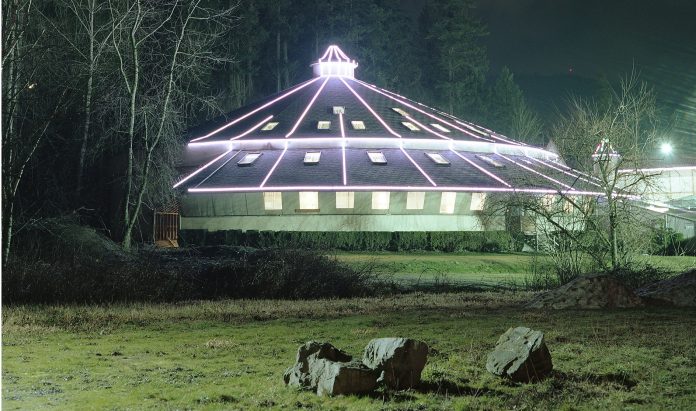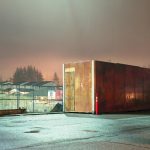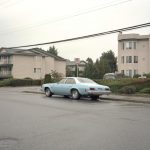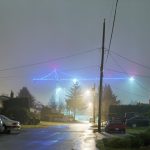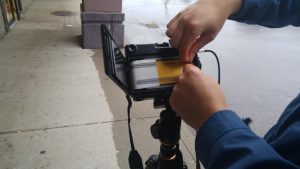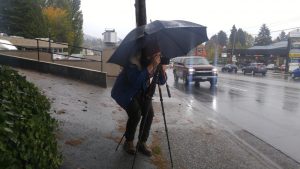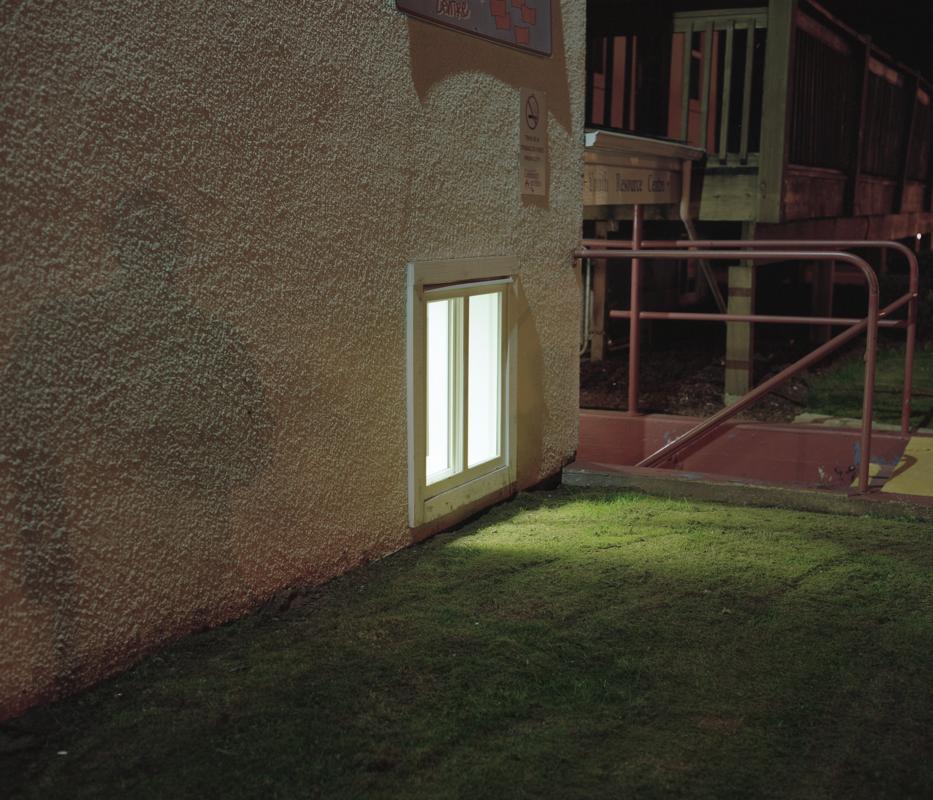
The sky above downtown Abbotsford has been overcast all day. As we pull up to the parking lot and get out of my car, the wind blasts thin and unforgiving. People dash from their cars into stores and back, opting to limit their time exposed to the elements. In a matter of minutes, the weather worsens, and rain falls on the streets of Abbotsford.
Beside me, Jiles Molina reaches into the bag slung over his shoulder. Rolls of film click against each other as he takes inventory. I can’t tell how many rolls he’s brought with him, but I can see that there are more than one kind. Satisfied, he picks up the collapsed tripod leaning against the car, and turns to me.
“Let’s go.”
Click image to enlarge.
Molina has been taking photographs for years now, and focuses on documenting place. He works in Sechelt throughout the week, and comes back to Abbotsford on the weekends, which affords him the opportunity to shoot two vastly different landscapes.
Shooting on film allows him to focus on the moment.
“I prefer not seeing the picture right away,” he tells me. “When you scan the pictures after not seeing them for months, it gives you a reflection on what you were doing at the time, and what you can do next time.”
Going out after having waited months, he says, forces him to focus.
“If I were to have a digital camera, I could go out the next night and re-shoot,” says Molina. “I think my pictures would turn out worse.”
Molina has a set of locations he wants to shoot, but I notice he walks patiently, despite the cold weather. He shoots on film, which means every shot is all or nothing. His chosen format comes hand in hand with an imposed restraint, which informs how he chooses his subjects.
“I’ll have a house in mind that I want to take a picture of,” he tells me. “Once I get that picture, I’ll wander around. I spend a lot of time driving, and not taking pictures.”
Molina’s job with a hospital transfer unit gives him enough mobility to scout possible locations to shoot, mostly throughout Abbotsford and Sechelt.
Molina actively adds to two ongoing projects, each focused on the cities he lives in.
“Local Traffic is about the Sunshine Coast, and City in the Country is about Abbotsford,” he tells me. “I try to give an adequate representation of these places that turns away from a tourism point of view.”
A focus on documenting the aspects of our surroundings that go overlooked, it seems, explains Molina’s subjects.
“To give a local viewpoint of both these places is my end-goal,” says Molina. “Whether that presents itself in a book or not is subject to change.”
In the meantime, Molina spots something of interest. It’s a square building on the corner of a street, an Asian restaurant from the looks of it. Many eyes have no doubt skipped over it; buildings like these have a tendency to blend into the background, but Molina says it’s representative of the landscape.
Click image to enlarge.
“My goal is to give people my perspective on the area,” says Molina, “or a new perspective on things they’ve seen a lot.”
The most obvious aspect of Molina’s photography that presents a new aspect of the everyday to viewers is his propensity for taking pictures at night without flash, letting light in through long exposure times.
“I rarely use flash,” says Molina. “Exposure times can range from 30 seconds to 10 minutes.”
Molina tells me that shooting at night is far removed from shooting during the day.
“Everything looks different,” he says. “The sky is black instead of white, which is drastic. Noises are different. The people that you run into are different.”
Self-deprecating, Molina underplays its novelty.
“Just after I graduated, I felt like I wanted to try it,” he says. “I thought I had the potential to make okay pictures at night, at least subconsciously.”
The rain hasn’t let up, but Molina is undeterred. Hunched over, he balances an umbrella on his shoulder. Using one hand, he stabilizes a tripod on the ground, then takes out a roll of film, prepares it, and inserts it into the back of the camera. Then he looks back at me, umbrella in hand.
“I’ve just got to clean the lens here before I start,” he says.
We walk for a while before he spots a red building, and sets up a shot from across the street, adjusting the tripod accordingly. He bends over the camera, and glances through the viewfinder. The rain is coming down hard. As he tries to take the picture, wind pulls at Molina’s umbrella, so he drops it. Cars drive by and their passengers throw curious glances in our direction. Picking up his tripod, Molina moves up the hill. I ask if he’s trying to avoid getting cars in the photo.
“No,” he answers. “I’m trying to make it so my tripod doesn’t fall over.”
A couple of seconds later we’re walking back down the street. Five minutes of setting up in the rain comes to a head in less than a second. No flash, no electronic beep, no instant preview — only the shutter mechanism’s faint clicking betrays that anything has happened.
I ask him what about that particular building was interesting.
“The banner,” he answers. “That one looks like it’s about to fall off.”
He’s right. I hadn’t noticed it, but on the corner of the square building, a large pink banner’s loosened corner flaps in the wind. Jiles is telling me about the buildings he’s planning on photographing, when we come across the curb which delineates a parking area.
“Oh, this is interesting,” he says, setting up the tripod once more.
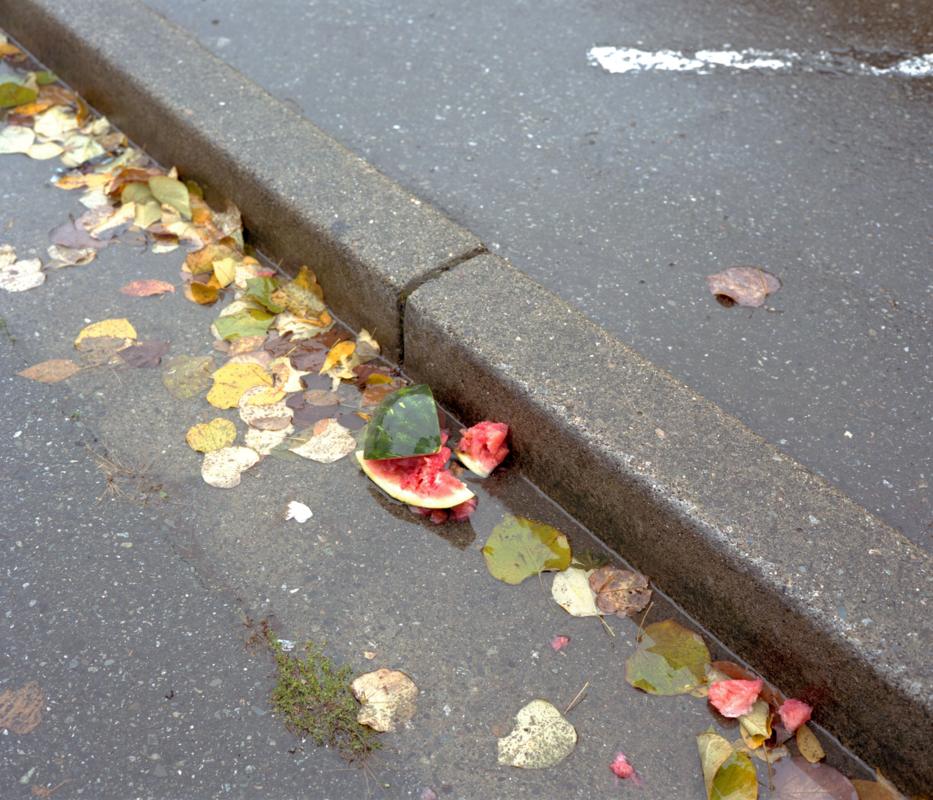
Someone’s thrown a watermelon (or part of one) next to the curb. As mundane as the fruit might be, it strikes me that I didn’t notice it sooner. The red clearly stands out against the pavement.
We say our goodbyes, but Jiles stays behind. As I get into my car, I scold myself for not remembering to bring gloves. Before pulling away, I look up from my seat. It’s cold, the rain has picked up drastically, cars are whipping by, and yet here’s Jiles Molina, balancing an umbrella on his shoulder as wind throws his hair about his face. All for a photograph.
Click image to enlarge.

